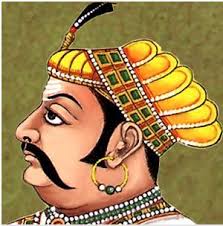Bappa Rawal
Mewar king and 'Kaal' for Arab Invaders
Intro
Bappa Rawal (c. 8th century) was a king of the Mewar kingdom in Rajasthan, India. The bardic chronicles describe him as a member of the Guhila Rajput Clan, and some of them consider him to be the founder of the Guhila dynasty. He is credited with repelling the Arab invasion of India.
Eklingji and Early life
Bappa's father Nagaditya and all other male members of his family were killed in a battle with the Bhils of Idar. He remained in disguise, accompanied by his two loyal Bhil attendants. He was brought up by a Brahmin lady of Nagda, who employed him as a caretaker of cows. One day, he met the sage Harit Rashi.[3] The sage agreed to initiate him into a Shaivite order, and to grant him immortality and supernatural powers. With this power, he defeated his father's killers, and established the Mewar Kingdom. According to legends the rishi also encouraged Bappa to build renowned Eklingji Temple at Nagda, which has been family deity of rulers of Mewar ever since
Rawal real name was KalBhoj as per historians Although many different historians mention him with different name but Bappa Rawal was surely a title he assumed after establishing Mewar The word "Bappa" means "father", and Rawal is a royal title.
Battle of Rajasthan
Bappa Rawal played an important role in the Battle of Rajasthan, a series of wars fought in the 8th century AD between the regional rulers of North-Western India and the Arabs of Sindh, in which the regional Indian rulers inflicted a resounding defeat on the invading Arabs. In the 8th century Arab Muslims started attacking India within a few decades of the birth of Islam, which was basically an extension of invasion of Persia. In order to ward off Muslim invasions across the western and northern borders of Rajputana, Bappa united the smaller states of Ajmer and Jaisalmer to stop the attacks. Bappa Rawal fought and defeated the Arabs in the country and turned the tide for a while. Bin Qasim was able to defeat Dahir in Sindh but was stopped by Bappa Rawal. Some accounts say that Qasim attacked Chittor, which was ruled by Mori Rajputs. Bappa, of Guhilot dynasty, was a commander in Mori army and so was Dahir's son. Bappa defeated and pursued Bin Qasim through Saurashtra and back to the western banks of the Sindhu (i.e. current day Baluchistan). He then marched on to Ghazni and defeated the local ruler Salim and after nominating a representative returned to Chittor. After Raja Mori named Bappa Rawal his successor and crowned him King of Chittor, Bappa Rawal and his armies invaded various kingdoms including Kandahar, Khorasan, Turan, Ispahan, Iran and made them vassals of his kingdom. Thus he not only defended India's frontiers but for a brief period was able to expand them.
Bappa set up many trading posts at every 100 kilometers with 100 troops while returning to Mewar after defeating the Arabs. One of them was Rawalpindi, named after him. These efforts helped extend the sway of Mewar up till Iran. He is known to have gone up till Ghazni, defeated and slain Commander Salim, and then place Salim’s nephew on the throne. Such evidence illustrates how Bappa Rawal had emerged as one of the strongest political leaders in India in the 8th century AD.

Bappa Rawal
Jai Enklingji, Jai Hind